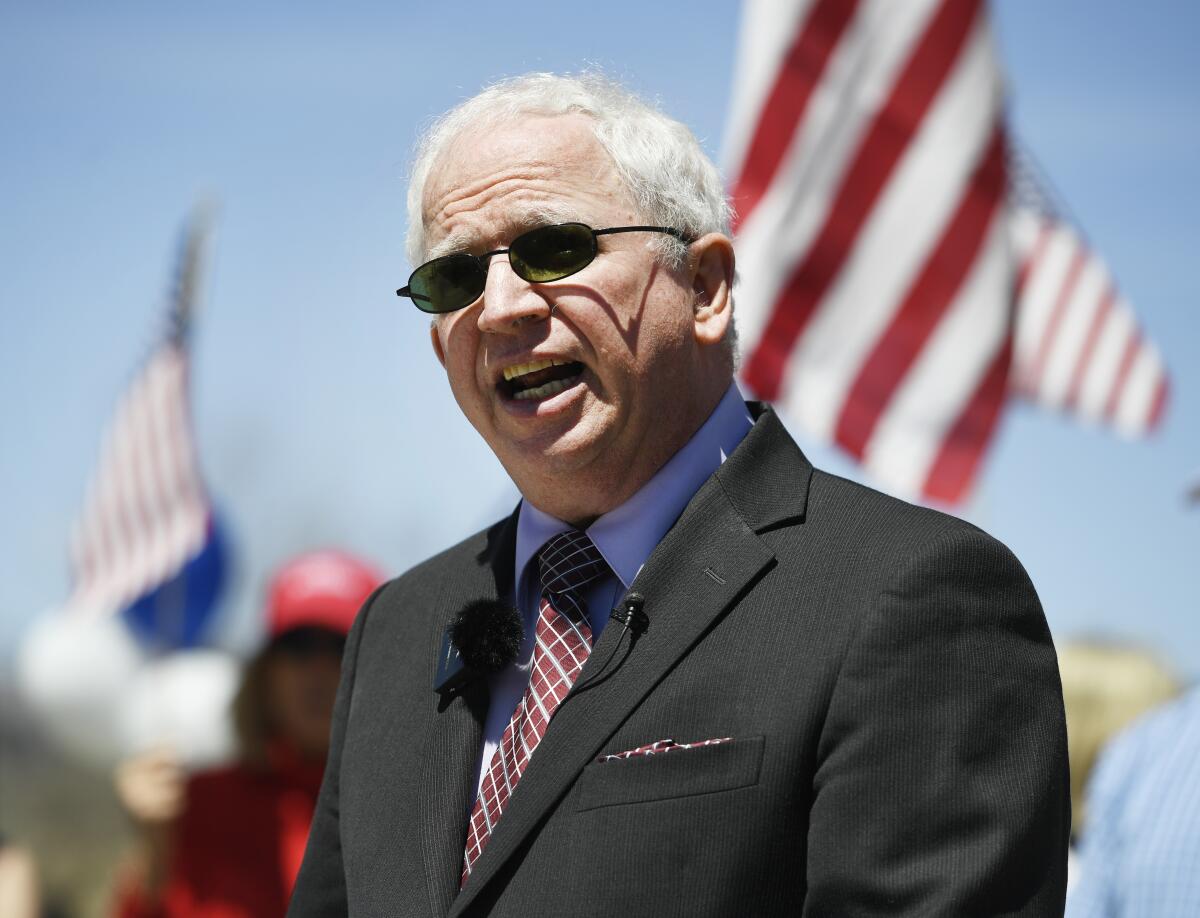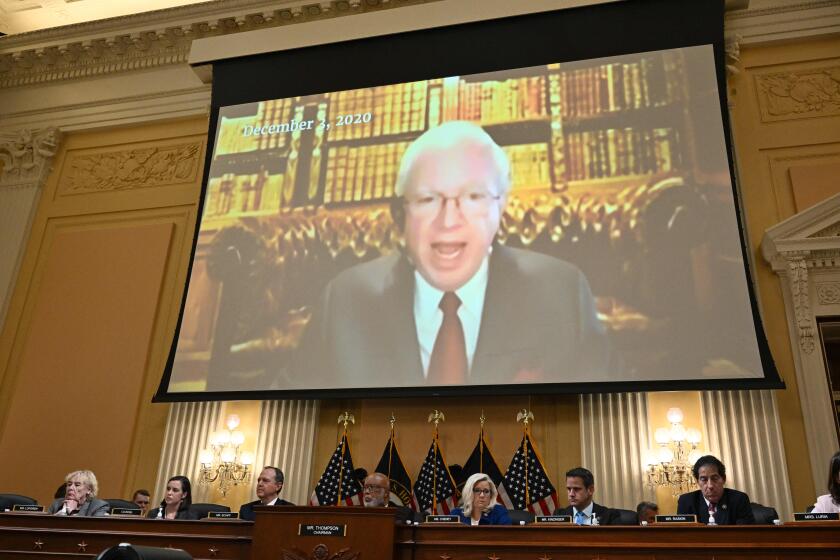State Bar argues that former Trump advisor John Eastman should lose his law license

- Share via
John Eastman, once the dean of Chapman University’s law school and an advisor to former President Trump, should lose his law license for peddling a bogus legal strategy designed to overturn the 2020 election, the State Bar of California argued Tuesday.
The State Bar has accused Eastman of ethics violations for promoting false claims that electoral cheating cost Trump the election, even after the U.S. attorney general rejected claims of widespread fraud and dozens of courts scuttled fraud cases.
Despite President Biden’s election victory, according to the Bar, Eastman urged state officials not to certify election results and pressured Vice President Mike Pence to reject electors in states Biden had won.
The Bar also accuses Eastman of fueling the Jan. 6 attack on the Capitol by telling thousands of Trump supporters at the National Mall that the election had been stolen, including the claim that “dead people had voted.”
“All of his misconduct was done with one singular purpose — to obstruct the electoral count on Jan. 6 and stop Vice President Pence from certifying Joe Biden as the winner of the election,” said Duncan Carling, an attorney representing the Bar.
His remarks came on the first day of Eastman’s trial before the California Bar Court, which is scheduled to hear the case over the next two weeks in Los Angeles.
State Bar of California files disciplinary charges against Orange County attorney John Eastman, accusing him of multiple ethics violations stemming from his actions while advising then-President Trump on how to overturn the 2020 election.
Carling said that Eastman’s legal theory that Pence could reject the electors of certain states or delay the vote count was “baseless, completely unsupported by historical precedent or law, and contrary to our values as a nation.”
It represented “his last-ditch effort in a long course of increasingly desperate attempts to overturn the election,” Carling said. He said Eastman tried to drum up slates of alternate electors “to stop the orderly transition of power” and pressured Pence to ignore the law and “override every branch of government.”
Carling said Eastman knew — and privately admitted — that his theory had no chance of prevailing in court, and that “he was fully aware in real time that his plan was damaging the nation,” pressing the scheme even after the Jan. 6 violence.
“All of Dr. Eastman’s conduct was fundamentally dishonest and intended to obstruct the lawful certification of the winner of the 2020 election on Jan. 6,” Carling said. “It breached the most important ethical duties of attorneys, of honesty and adherence to the rule of law.”
Eastman’s attorney, Randall Miller, argued that his client could not be disciplined for advancing a legal theory that was arguably tenable, and not “so completely lacking in merit” than a reasonable lawyer might buy it. He said Eastman had just been doing his duty to advocate vigorously on behalf of his client, then-President Trump.

He said Eastman began working on an “election integrity team” launched by Trump two months before the November 2020 election because of his decades of litigation and scholarly experience.
“He was not there to steal the election or invent ways to make President Trump the winner if in fact he lost,” Miller said. “The focus was on ensuring the election was property and legally conducted and certified, and votes were properly counted.”
John Eastman, the former Trump lawyer who helped foment the plan to invalidate the 2020 election results, left the Chapman University law faculty last year. But his legacy still sparks campus questions.
He said Eastman’s goal was to delay the counting of votes “so there could be a reasonable investigation” into claims of election irregularities.
His aim was to ensure that “the rightful winner of the election was properly certified,” Miller said, adding that Eastman’s legal ideas were “viable, tenable” and “advanced in good faith.”
Eastman’s remarks to Pence about his power to refuse to certify the electors “was just advocacy,” Miller said, but the ultimate decision lay with Pence, and Pence rejected Eastman’s theory.
“There’s not any threat to democracy. All roads led through Vice President Pence,” Miller said, characterizing the exchanges between Eastman and Pence’s attorney as “two smart people talking about the scope of constitutional authority, which was by far not clear — an honest debate held in good faith that lawyers do.”
The hearing continues Wednesday. Eastman was the dean of Chapman’s law school from 2007 to 2010, and continued teaching there until 2021, when more than 100 faculty members and people associated with the school denounced his role in the events of Jan. 6.
More to Read
Sign up for Essential California
The most important California stories and recommendations in your inbox every morning.
You may occasionally receive promotional content from the Los Angeles Times.
















